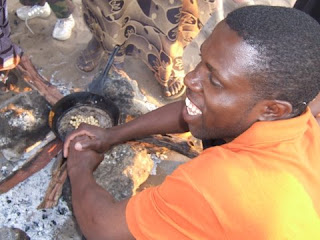On Sunday after church, three days before the celebration, we met with a few of the committee members to plan an event for 300 people. We tried to plan a menu, a program and sort out many of the details, but this is Africa and planning is not done the same way as home. In Canada this would never fly!
Monday morning Mom and I went shopping with a couple of the cooks and filled up the back of the truck full of food. We bought huge bags of chicken, rice, potatoes, tomatoes and the lot. It’s hard to comprehend, but a meal like that is only for very special occasions in the village that we work with. Some of the kids had not had rice before and chicken was very rare. So although it was a big job, there was an element of excitement in our task.
We then spent the rest of the day frantically trying to put together gift packages for each of our 180 kids… not an easy task! We used the remainders from other give-aways, as well as some recently received packages from Canada. The gift packages all had some bas
 ic school supplies in them like paper, crayons, markers, pens and pencils and then we tried to put a few items in each bag that were age specific. Our favourites were the packages for our youngest orphans that contained lovely cuddly stuffed animals, a rare treasure for them!
ic school supplies in them like paper, crayons, markers, pens and pencils and then we tried to put a few items in each bag that were age specific. Our favourites were the packages for our youngest orphans that contained lovely cuddly stuffed animals, a rare treasure for them!The morning of the event was spent running last minute errands, checking on the hardworking cooks (of which there were about 20) while mom and Kimmie worked away on the gifts. We were truly African when we were still at home trying to organize, label and package the gifts at 3pm when the program was due to “start” at 2!
Daryl had the opportunity to share the Christmas story and it was a great success. We also sung some Christmas carols which the kids loved. The most successful part of the day for us was having the kids eat FIRST(!!!), before the elders and caregivers. This was a huge feat as it is very counter cultural and has yet to happen at any of the big celebrations at project. Everyone participated in the celebration feast in a relaxed way, all the kids lined up without pushing and shoving and chaos did not ensue.
The gift giving also went amazingly well as we called the kids one by one to receive their gifts. There were many smile s on many faces. After that we had the opportunity to honour the volunteers and cooks by giving them a small financial gift that had been donated by some of our supporters. Daryl and I also ordered custom t-shirts for all of them but unfortunately this is Africa and they weren’t done on time.
We were setting ourselves up for disaster but it was far from it. We thank God.
For more pictures:
http://www.facebook.com/album.php?aid=49000&l=9e8b3&id=518018255








































